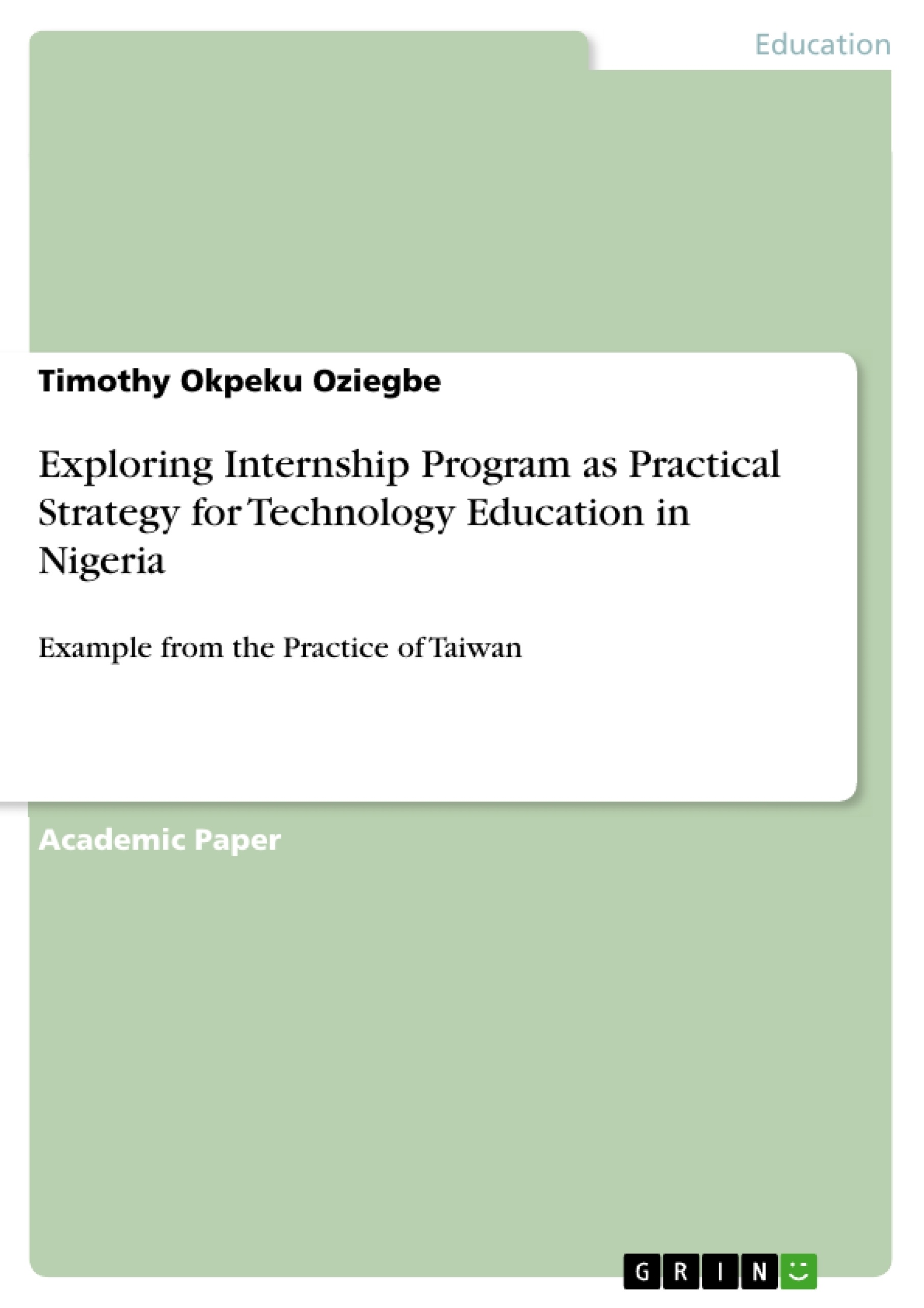This study examines the perception of faculty members and students regarding internship program as a practical strategy for technology education in Nigeria, taking an example from the practice of Taiwan. The study adopted a basic qualitative design that employed the views and opinions of faculty members and students in some selected universities that were explored regarding the internship program as a practical strategy for technology education in Nigeria and taking examples from the practice of Taiwan. A face-to-face interview was conducted in the study to elicit the views and opinions of 15 participants (that is, seven faculty members and eight students) regarding the internship program at a selected university in Nigeria.
The internship practices of technology education in Taiwan could be a clear model for Nigeria’s internship program. Exploring the internship practice of Taiwan could help technology education students in the university meet the knowledge and skills gap in technology education, thus reducing unemployment among the youth to meet global standards.
Inhaltsverzeichnis (Table of Contents)
- Abstract
- Introduction
- Problem Statement
- Purpose of the Study
- Research Questions
- Methodology
- Participants Selection
- Analysis Setting
- Findings
- Demographic setting
- Faculty Member Demographics Variables
- Students Demographics Variables
- Participants' Excerpts for Research Question 1
- Participants' Excerpts for Research Question 2
- Summary of Findings
- Findings of Research Question 1
- Findings of Research Question 2
- Interpretation and Discussion of Research Question 1
- Interpretation and Discussion of Research Question 2
- Recommendations
- Conclusion
- References
Zielsetzung und Themenschwerpunkte (Objectives and Key Themes)
This study investigates the perceptions of faculty members and students regarding internship programs as a practical strategy for technology education in Nigeria, using the example of Taiwan. The study aims to understand how internship programs contribute to bridging the gap between theoretical knowledge and practical skills required for the technology sector. It explores the effectiveness of internship programs in meeting the expectations of technology education in Nigeria.
- The role of internship programs in addressing the skills gap in technology education in Nigeria
- The perception of faculty members and students on the effectiveness of internship programs
- The potential of the Taiwanese internship model for application in Nigeria
- The challenges and opportunities associated with implementing effective internship programs
- The impact of internship programs on the employability of technology education graduates
Zusammenfassung der Kapitel (Chapter Summaries)
The study begins by introducing the problem of declining quality in higher education in Nigeria, leading to a lack of employability among graduates. It highlights the importance of practical skills and the role of internship programs in addressing this issue. The study then focuses on the methodology, outlining the participants' selection and the data analysis approach. It explores the demographic characteristics of the participating faculty members and students. The key findings of the study are presented, including the perceptions of faculty members and students regarding internship programs. These findings are then discussed, and recommendations for improving the effectiveness of internship programs in Nigeria are provided.
Schlüsselwörter (Keywords)
The main keywords and focus topics of the text include internship programs, technology education, Nigeria, Taiwan, youth unemployment, skills gap, practical skills, theoretical knowledge, employability, and higher education. The study investigates the effectiveness of internship programs in addressing the challenges of technology education in Nigeria and explores the potential of the Taiwanese internship model for improving the quality of education and increasing the employability of graduates.
Frequently Asked Questions
What is the goal of this study on technology education in Nigeria?
The study explores internship programs as a practical strategy to bridge the skills gap in Nigeria's technology education sector.
Why is the Taiwanese model used as an example?
Taiwan's successful internship practices serve as a clear model for improving practical skills and reducing youth unemployment.
Who were the participants in this qualitative research?
The study involved face-to-face interviews with 15 participants, including seven faculty members and eight students from Nigerian universities.
What are the main findings regarding the "skills gap"?
The study finds that current education often lacks practical application, and structured internships are vital to meet global industry standards.
What are the recommendations for Nigeria?
The study recommends adopting structured internship frameworks similar to Taiwan to enhance the employability of technology graduates.
- Quote paper
- Dr. Timothy Okpeku Oziegbe (Author), 2023, Exploring Internship Program as Practical Strategy for Technology Education in Nigeria, Munich, GRIN Verlag, https://www.grin.com/document/1339547



